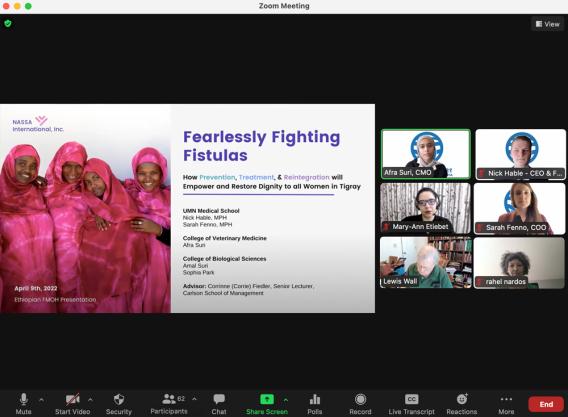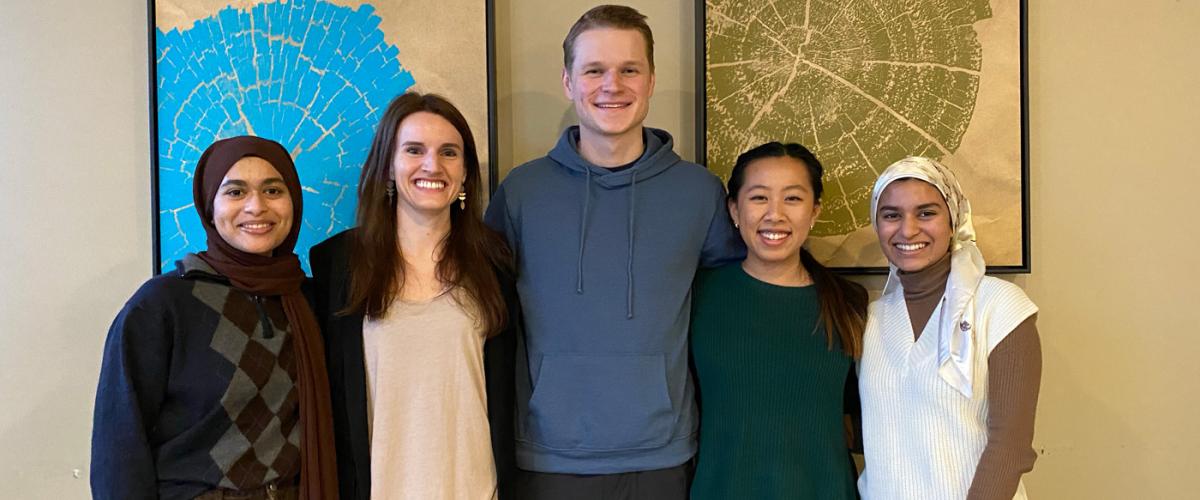Multidisciplinary Team Takes First Place at Case Competition
Team 5 was the winning team in this year's Case Competition. From left to right: Afra Suri, Sarah Fenno, Nick Hable, Sophia Park, Amal Suri
The Center for Global Health and Social Responsibility successfully held our ninth annual Global Health Case Competition January 20–29, which included over 50 student participants from 13 University of Minnesota schools or colleges.
Out of the 10 teams that ultimately participated in the competition, only one could come out in first place, winning the chance to participate in Emory University's international Global Health Case Competition as well as a cash prize.
This year's winning team was team 5, which included both graduate and undergraduate student participants. Team members were Sarah Fenno (Medical School), Nick Hable (Medical School), Sophia Park (College of Biological Sciences), Afra Suri (College of Veterinary Medicine), and Amal Suri (College of Biological Sciences). The team was coached by Corrie Fielder of the Carlson School of Management.
The second place team also receives a prize. This year's second place team was team 6, which included Abigail Boettcher (School of Public Health), Meghan Ford (School of Public Health), Bhavana Goparaju (Institute of Health Informatics), Ratchada Jantraporn (School of Nursing) and Anna Pirsch (School of Nursing). Their coach was Vanessa Tennyson.

The case scenario for this year’s competition centered on a tragic case of a fictionalized young woman in Ethiopia who experienced obstructed labor resulting in obstetric fistula, a traumatic injury to their bladder, vagina and/or rectum.
Teams were required to analyze the real-life situation of obstetric fistula in Ethiopia's Tigray region and propose solutions to develop sustainable and scalable initiatives to eliminate fistula, examining both reduction and treatment strategies.
"Quite often, higher education has been accused of being too insular from actual happenings in the world. One of the beauties of the Case Competition is that it tries to replicate real world situations when you'll be working across disciplines, across sectors, and across countries," said Shailey Prasad, MD, MPH, executive director of CGHSR. "So in many ways, this is probably the best pedagogical model of application of the knowlege we all learn in our own individual disciplines."
This year's coaches also brought expert voices from the real-world work of global women's health into the simulated competition environment. The final round of the competition was judged by Mary-Ann Etiebet, MD, MBA, lead of Merck for Mothers; L. Lewis Wall, MD, DPhil, MBioeth, Professor Emeritus of Sociocultural Anthropology and of Obstetrics and Gynecology at the Washington University in St. Louis; and Rahel Nardos, MD, MCR, director of global women's health at CGHSR. The first round judges panel was made up of a multidisciplinary group of health experts from the UMN and beyond.
We congratulate all teams on their incredible work and dedication to this competition, especially for making the second year of a virtual competition such a resounding success. The center also extends a special thank-you to the group of coaches who volunteered their time and energy to work with the teams during competition week.
